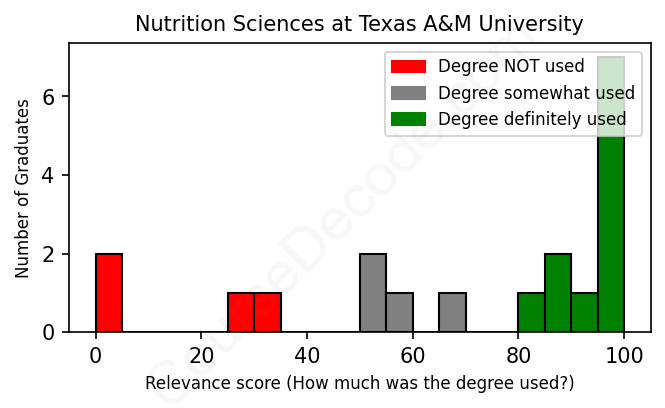
First, some facts. Of the Nutrition Sciences graduates from Texas A&M University we've analyzed , here's how many have used (or NOT used) their degree in their career:

These are estimates based on AI analysis of 19 LinkedIn profiles (see below).
The verdict? Slightly above average. Overall, with an average relevance score of 70%, Nutrition Sciences graduates from Texas A&M University have a slightly higher likelihood (+3%) of finding work in this field compared to the average graduate across all fields:
And for comparison, here's the chart for all profiles we've looked at across all degrees.
Also, after graduating, 42% of these graduates have pursued further education other than another Bachelor's degree (such as a Masters degree or other), compared to the average across all profiles of 35%. This suggests you may need more than just a Bachelors degree to be competitive as a Nutrition Sciences graduate.
See the details:
|
Relevance score: 100% We think this person has gone into a career highly relevant to their degree. We think this person has gone into a career highly relevant to their degree.
DEGREE INFOGraduated in 2015 from Texas A&M University with a Bachelor of Science (BS) in Nutrition Sciences. No other secondary education since. JOB HISTORY SINCE GRADUATIONDietetic Technician Aramark Healthcare at Baylor University Medical Center Aug 2015 - Present ABOUTNo information provided. |
The top 10 most common jobs done by the graduates we've analyzed (ranked most common to least) are:
Here is a visual representation of the most common words in job titles for Nutrition Sciences graduates (this is across all Nutrition Sciences graduates we've analyzed, not just those who went to Texas A&M University):

Looking at the career trajectories of Texas A&M University graduates who studied Nutrition Sciences, it seems like many of them have started their careers in roles that are somewhat related to nutrition or healthcare, especially within the first few years after graduation. For example, positions like Medical Assistant or Dietetic Technician appear quite frequently among the earlier jobs, showing a strong tie to clinical settings or health-focused roles. These first jobs generally serve as stepping stones into more specialized fields such as dietetics, nutrition consultancy, or even roles in healthcare management as they gain experience.
Fast forward five to ten years, and many of these graduates have transitioned into more senior roles, such as Registered Dietitian or Population Health Advisor, reflecting a solid upward trajectory in their careers. Others have ventured into niche areas within the industry, like regulatory affairs or research positions, showcasing the diverse paths one can take with a Nutrition Sciences degree. However, it’s also worth noting that some alums have taken a more unconventional route, ending up in roles unrelated to nutrition, like teaching or marketing. Overall, though, a significant number of graduates seem to be continuing in fields that are quite relevant to their studies, underlining the versatility and value of the degree in the job market.
Honestly, a Bachelor’s degree in Nutrition Sciences, especially at a big university like Texas A&M, can be pretty challenging but also super rewarding if you’re into the subject. You’ll dive into everything from biochemistry to human physiology, which can be tough if you’re not into science. That said, if you’re passionate about nutrition and enjoy learning about how food affects health, you might find it easier than other majors because you’re more engaged with the material. Just be ready to put in the work, especially with some of the labs and projects, but with good study habits and a bit of dedication, you'll definitely be able to handle it!
Most commonly, in the LinkedIn profiles we've looked at, it takes people 4 years to finish a Bachelor degree in Nutrition Sciences.
Looking at the career paths of these Nutrition Sciences grads from Texas A&M, it feels like they’ve had a pretty decent range of earning potential. Many of them have moved into roles like Physician Assistants, Registered Dietitians, and even product development positions, which typically pay well, especially with mid-level experience. Some grads, like those who became Project Managers or Admins, might not be pulling in six-figure salaries right off the bat but seem to have stable jobs. The early positions like medical assistants and interns are usually on the lower end of the pay scale, but they pave the way for higher-paying opportunities later on. Overall, it looks like they’re doing alright, especially if they continue climbing the career ladder in health and nutrition.
Here is a visual representation of the most common words seen in the "about" section of LinkedIn profiles who have a Bachelor degree in Nutrition Sciences (this is across all Nutrition Sciences graduates we've analyzed, not just those who went to Texas A&M University). This may or may not be useful:

Here are all colleges offering a Bachelor degree in Nutrition Sciences (ordered by the average relevance score of their Nutrition Sciences graduates, best to worst) where we have analyzed at least 10 of their graduates:
| College | Score | Count |
|---|---|---|
 University of Connecticut University of Connecticut
|
85 | 11 |
 Penn State University Penn State University
|
76 | 13 |
 California Polytechnic State University-San Luis Obispo California Polytechnic State University-San Luis Obispo
|
75 | 12 |
 University of New Hampshire University of New Hampshire
|
71 | 10 |
 Arizona State University Arizona State University
|
70 | 12 |
 Texas A&M University Texas A&M University
|
70 | 19 |
 The University of Texas at Austin The University of Texas at Austin
|
60 | 21 |
 Montclair State University Montclair State University
|
59 | 10 |
 Kaplan University Kaplan University
|
54 | 12 |
 University of Arizona University of Arizona
|
46 | 20 |